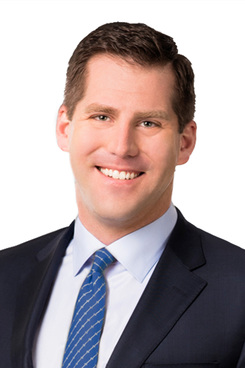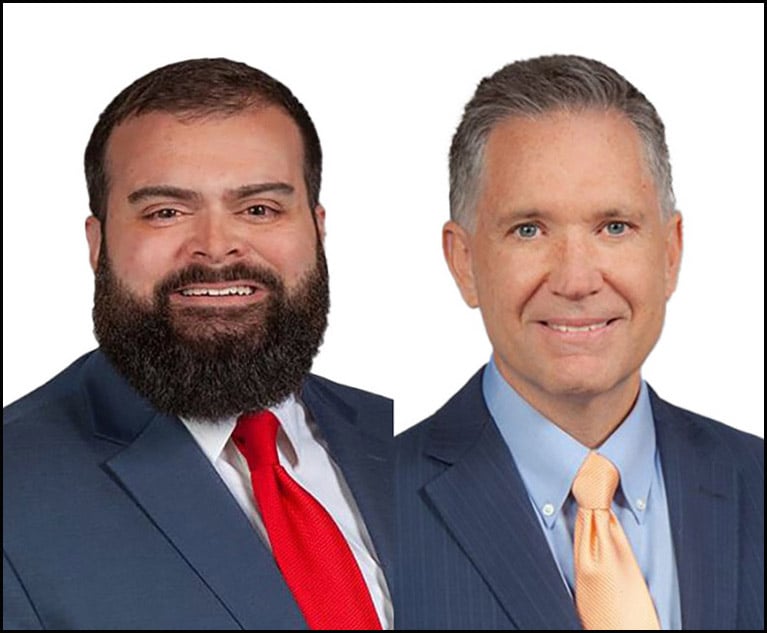Bigger Stakes, Lower Rates Lure Fox Rothschild's VC Co-Chair to Barton
Randolph Adler says his new firm has been able to "brain drain" Big Law thanks to its approach to compensation and client service. "The midsized sophisticated boutique market is going to experience wild growth," he says.
June 11, 2020 at 07:07 PM
5 minute read
 Randolph Adler. (Courtesy photo)
Randolph Adler. (Courtesy photo)
Randolph Adler has made a home advising startups and venture investors at law firms of all sizes: from Skadden, Arps, Slate, Meagher & Flom to his own small boutique, ADLER LP, to megafirm Dentons and then to Fox Rothschild, where he helped lead the firm's venture capital and emerging companies group since 2017.
Now Adler is on the move again. This month he joined Barton, a much smaller New York firm packed with other Big Law alums, to co-lead its own emerging companies and VC practice.
Adler represents businesses in all stages of the corporate life cycle, and investors seeking opportunities in today's innovation economy. From entity formation and financing—seed, early-stage and late-stage venture capital and private equity—to public offerings and mergers and acquisitions.
He shared the strategy behind his latest move in this lightly edited interview.
Tell us about your practice.
I work with a variety of startups and emerging growth companies from ideation to IPO and beyond. I recently secured some well-known, brand-name startups, from Tier 1 Big Law firms. These are startups and emerging companies raising growth capital of at least $50 million, mostly in the tech space, involving the software, hospitality, health care and AI industries.
To this point, my industry experience ranges from the traditional to the innovative, including augmented reality/virtual reality, beauty, consumer packaged goods, cybersecurity, digital media, e-sports, fintech, health care, internet of things, machine learning, proptech, and software as a service (SaaS).
Why did you decide to make this move?
If you visit Barton's website, there is an image of a new, sleek, efficient speed yacht racing ahead of an old, rusty tanker, which is inefficient and costly to even maintain. This is how I see Barton compared to Big Law.
Barton, based in New York, was formed in 2011 by Roger Barton of Sidley Austin. Roger innovated a law firm model that allowed a 50-lawyer boutique to effectively compete against Big Law. One example is compensation. Barton's model has allowed this large boutique firm to "brain drain" Big Law. Big Law pays you approximately 25-33% of the collections from the cases that you handle. At Barton, if you work and originate the case, you receive a higher percent of the profit—something like 50%. It encourages an incredible exodus. This has allowed Barton to possess the sophistication of an Am Law 50 law firm, while possessing all the boutique qualities that clients love.
Barton has doubled in size over the past three years. There are approximately 50 attorneys, including 40 in New York, almost all are lateral partners from big law firms. There are 10 attorneys in the firm's emerging companies and venture capital practice.
What else about Barton is a better fit for your practice?
We were in talks since December. Barton represents Fortune 500 companies, but at the same time has a price point that startups can pay and practical advice that reduces their cost. We can handle the entire life cycle of a company, as well as the work for the funds and investors themselves. Barton is able to handle either side of a transaction.
We have sophisticated, super high-end attorneys, less bureaucracy, and are available to our clients. Startups and emerging growth companies want a partner's advice. Big Law has these wild partner rates. Companies end up using associates there, who may not be as experienced, for a higher rate than a Barton partner. The midsized sophisticated boutique market is going to experience wild growth.
My rate is actually dropping at Barton by 15-20%. All of my clients are moving with me. I anticipate other colleagues will follow me to Barton. And, the firm recently acquired attorneys from Katten [Muchin Rosenman] and Gibson, Dunn [& Crutcher].
Will the outbreak of COVID-19 affect the number of emerging startup companies?
The essence of startups is they are always creating solutions to emerging problems. We are seeing a shift in the market. If you are hospitality startup, you may be challenged to make sales now while hotels and restaurants are closed, but the market will adapt and find a way.
Meanwhile, the tech space is flourishing, because of people working remotely. Zoom has again raised the guidance for the high-end range for their IPO. Cybersecurity, AI, digital media, advertising, e-sports and fintech are all doing better as result of the shifting behaviors of society resulting from the pandemic, which I see continuing for the longer term. Tech companies evolve with the latest technology and to what the market demands.
Barton is a high-growth enterprise. Many big firms have cut partner draws, associates, staff and salaries, while Barton has grown during the pandemic.
Tell us about the trends you envision going forward?
In 2009 and 2010 there were few startups due to the economic distress. Over the past two years there has been a trend of companies being acquired. Until 2017, companies were sitting on cash. That spigot started to flow and you had a number of startup companies become competitors, so they merged. Funds, especially private equity vehicles, took an interest in tech businesses as they moved downstream.
With the economic downturn from the pandemic, a wide range of startups, including those in the mid-to-late-stage, may fail. However, those who work at startups may start their own companies. This means there could be the initiation of a new cycle, and the surge of early-stage startup companies will occur. There is increased focus on the efficiency and stretch of the legal spent dollar, and the full-service boutique firm is best suited to provide legal services in this environment.
This content has been archived. It is available through our partners, LexisNexis® and Bloomberg Law.
To view this content, please continue to their sites.
Not a Lexis Subscriber?
Subscribe Now
Not a Bloomberg Law Subscriber?
Subscribe Now
NOT FOR REPRINT
© 2025 ALM Global, LLC, All Rights Reserved. Request academic re-use from www.copyright.com. All other uses, submit a request to [email protected]. For more information visit Asset & Logo Licensing.
You Might Like
View All
Deal Watch: Are Only 'A Handful' of Law Firms Positioned Well After Citi-Apollo Partnership?
5 minute read

Law Firms Mentioned
Trending Stories
- 1Uber Files RICO Suit Against Plaintiff-Side Firms Alleging Fraudulent Injury Claims
- 2The Law Firm Disrupted: Scrutinizing the Elephant More Than the Mouse
- 3Inherent Diminished Value Damages Unavailable to 3rd-Party Claimants, Court Says
- 4Pa. Defense Firm Sued by Client Over Ex-Eagles Player's $43.5M Med Mal Win
- 5Losses Mount at Morris Manning, but Departing Ex-Chair Stays Bullish About His Old Firm's Future
Who Got The Work
J. Brugh Lower of Gibbons has entered an appearance for industrial equipment supplier Devco Corporation in a pending trademark infringement lawsuit. The suit, accusing the defendant of selling knock-off Graco products, was filed Dec. 18 in New Jersey District Court by Rivkin Radler on behalf of Graco Inc. and Graco Minnesota. The case, assigned to U.S. District Judge Zahid N. Quraishi, is 3:24-cv-11294, Graco Inc. et al v. Devco Corporation.
Who Got The Work
Rebecca Maller-Stein and Kent A. Yalowitz of Arnold & Porter Kaye Scholer have entered their appearances for Hanaco Venture Capital and its executives, Lior Prosor and David Frankel, in a pending securities lawsuit. The action, filed on Dec. 24 in New York Southern District Court by Zell, Aron & Co. on behalf of Goldeneye Advisors, accuses the defendants of negligently and fraudulently managing the plaintiff's $1 million investment. The case, assigned to U.S. District Judge Vernon S. Broderick, is 1:24-cv-09918, Goldeneye Advisors, LLC v. Hanaco Venture Capital, Ltd. et al.
Who Got The Work
Attorneys from A&O Shearman has stepped in as defense counsel for Toronto-Dominion Bank and other defendants in a pending securities class action. The suit, filed Dec. 11 in New York Southern District Court by Bleichmar Fonti & Auld, accuses the defendants of concealing the bank's 'pervasive' deficiencies in regards to its compliance with the Bank Secrecy Act and the quality of its anti-money laundering controls. The case, assigned to U.S. District Judge Arun Subramanian, is 1:24-cv-09445, Gonzalez v. The Toronto-Dominion Bank et al.
Who Got The Work
Crown Castle International, a Pennsylvania company providing shared communications infrastructure, has turned to Luke D. Wolf of Gordon Rees Scully Mansukhani to fend off a pending breach-of-contract lawsuit. The court action, filed Nov. 25 in Michigan Eastern District Court by Hooper Hathaway PC on behalf of The Town Residences LLC, accuses Crown Castle of failing to transfer approximately $30,000 in utility payments from T-Mobile in breach of a roof-top lease and assignment agreement. The case, assigned to U.S. District Judge Susan K. Declercq, is 2:24-cv-13131, The Town Residences LLC v. T-Mobile US, Inc. et al.
Who Got The Work
Wilfred P. Coronato and Daniel M. Schwartz of McCarter & English have stepped in as defense counsel to Electrolux Home Products Inc. in a pending product liability lawsuit. The court action, filed Nov. 26 in New York Eastern District Court by Poulos Lopiccolo PC and Nagel Rice LLP on behalf of David Stern, alleges that the defendant's refrigerators’ drawers and shelving repeatedly break and fall apart within months after purchase. The case, assigned to U.S. District Judge Joan M. Azrack, is 2:24-cv-08204, Stern v. Electrolux Home Products, Inc.
Featured Firms
Law Offices of Gary Martin Hays & Associates, P.C.
(470) 294-1674
Law Offices of Mark E. Salomone
(857) 444-6468
Smith & Hassler
(713) 739-1250






